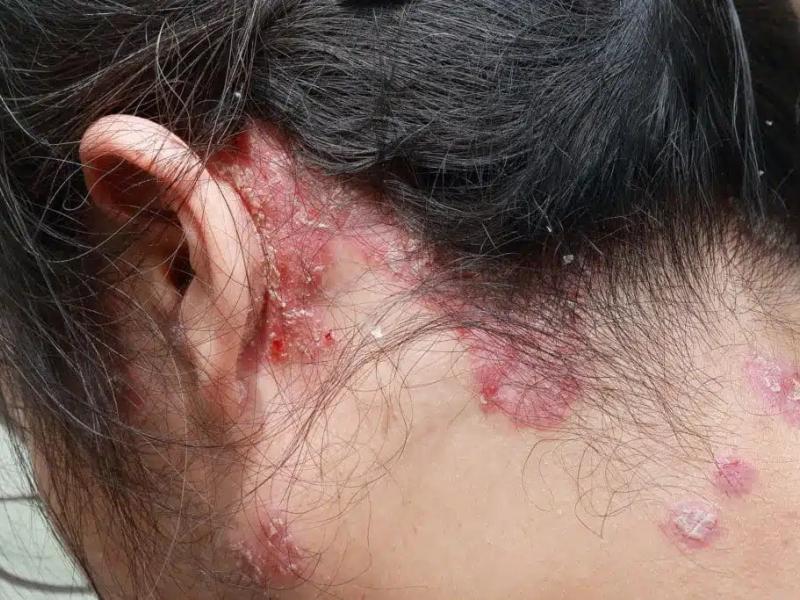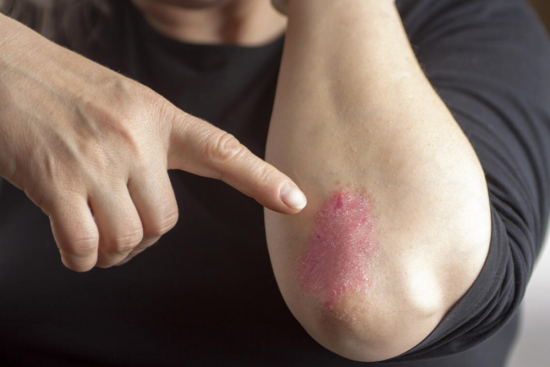Scalp psoriasis is a common skin condition that affects the scalp, causing scaly patches, itching, and irritation. It's a form of psoriasis, an autoimmune disease that causes a rapid buildup of skin cells on the surface of the skin. When this occurs on the scalp, it can lead to the formation of thick, silvery scales and redness.
Common symptoms of the disease
The manifestations of psoriasis on the scalp are localized at the hairline. Occasionally, this skin condition spreads to surrounding areas not covered by hair, especially the neck, ears, and forehead.
Scalp psoriasis is characterized by red, scaly patches of itchy, dry skin.
The patches are usually well-circumscribed and cause scaling, which can be very profuse.
Diagnosis of Scalp Psoriasis
Psoriasis is diagnosed by examining the appearance of the patient's scalp and the distribution of the lesions.
Dermatoscopy may reveal characteristic vascular changes. This helps to differentiate psoriasis from seborrheic dermatitis, a common clinical confusion between the two conditions.
Diagnosis of scalp psoriasis also involves a medical history. The doctor needs to consider the genetic component of the disease, as well as any recent changes in the patient's life that may have triggered it.
Rarely, a biopsy for histologic examination of a small sample of skin tissue under a microscope is needed to rule out other conditions.
Scalp Psoriasis Treatment
Treating scalp psoriasis can be difficult, but with the right treatments and strategies, it's possible to reduce symptoms and improve the overall condition of the scalp. The first step is to see a dermatologist who can diagnose and prescribe the right treatments for scalp psoriasis.
There are several treatment options for scalp psoriasis, ranging from topical medications to phototherapy and systemic medications.
Topical treatments
Topical treatments often include coal tar shampoos, salicylic acid products, and corticosteroid creams or ointments. These can help reduce inflammation, relieve itching, and eliminate excessive scaling. However, it's important to note that coal tar shampoos and some topical treatments can irritate the scalp and cause dryness, so it's important to follow instructions carefully and use them sparingly.
Phototherapy treatment
In some cases, dermatologists may prescribe phototherapy, a treatment that uses ultraviolet light to slow the growth of skin cells and reduce inflammation. This may be done with UVB phototherapy or puvatherapy (psoralen (P) and ultraviolet A (UVA) rays).
Systemic medications
For more severe cases of scalp psoriasis, systemic medications such as methotrexate, cyclosporine, or biologics may be prescribed. These medications work by suppressing the immune system and reducing inflammation. However, they often have potential side effects and require regular monitoring by a dermatologist.
Scalp hygiene: measures and instructions to follow
In addition to medical treatments, people with scalp psoriasis can take additional measures to manage their condition.
These include:
- Keeping the scalp moisturized with medicated lotions or thick emollients to prevent drying and flaking.
- Avoid scratching affected areas, as this can aggravate the situation and potentially lead to infection.
- Wash hair regularly with mild shampoos to help remove excess skin cells and reduce itching.
- Identify and avoid triggers that aggravate scalp psoriasis symptoms.
In conclusion, the disease can be effectively managed through a combination of medical treatments and lifestyle modifications. By working closely with a dermatologist, individuals can find the treatment plan best suited to their specific needs.
It's also important to remember that managing scalp psoriasis requires constant effort and patience. However, with the right strategies, it is possible to alleviate symptoms, reduce inflammation and improve the overall condition of the scalp.







